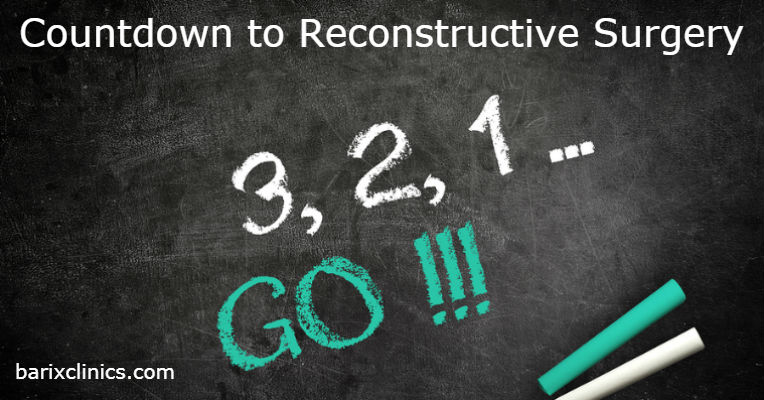Countdown to Reconstructive Surgery
After bariatric surgery, excess skin is a reality for many people. The excess skin can be unsightly and may get in the way of your new active lifestyle. Many consider reconstructive surgery as the natural next step towards restoring their health and well-being.
Having reconstructive surgery in mind as you undergo weight loss surgery can help you stick to post-bariatric surgery recommendations and get the best results possible so you’re ready for that next step. Here’s how to count down to reconstructive surgery:
10. Eat right, take recommended supplements, and exercise regularly after weight loss surgery to optimize nutritional status and muscle mass.
9. Attend follow-up appointments with your bariatric surgeon and nutritionist to make sure that you are on track and make a course correction if not.
8. Have lab tests every 3 months the first year after surgery to monitor your nutritional status. Take any additional supplements as recommended.
7. Call your patient service representative (800-282-0066) a month or two before you’re at goal weight to schedule a consultation with one of the reconstructive surgeons.
6. During your initial consultation with the reconstructive surgeon, you’ll find out about the surgical options to remove excess skin, your insurance coverage / co-pays; and you’ll have an opportunity to ask questions.
5. Three months prior to reconstructive surgery, have your iron levels and other nutritional lab tests done.
4. Bump up your cardio to increase your body’s ability to transport oxygen and nutrients to cells. Add some extra steps each day or join a Zumba class—whatever works for you.
3. Work to get those last few pounds off before your reconstructive surgery, but be sure to keep your protein and exercise up so that you lose mostly extra fat and hang onto your muscle tissue. Then 1 month before surgery, bump up your protein intake and continue with this higher level until 1 month post-op. Protein supplements are a great way to boost your protein during this time. Your temporary protein goal is a little higher than your post-bariatric-surgery protein goal. It represents 1.5 grams per kg of weight. Here’s the math to find your temporary protein goal:
Your weight in pounds x 0.68 = grams of protein per day
2. Arrange to take time off of work and find help to care for young children and household chores. It’s important that you set aside time to heal and plan for activity restrictions after surgery. Now’s also a great time to review Nutrition after Reconstructive Surgery on the back side of this handout to purchase and prepare foods and supplements ahead of time.
- Attend pre-admission testing and get medical clearance for your procedure(s) 1-2 weeks prior to surgery. You’ll meet with an internist, respiratory therapist, and nurse. Any necessary pre-surgery testing will be done. Bring those last-minute questions with you.
Congratulations, your day is here! Relax, the surgical and nursing teams are well-trained and will take good care of you.
Nutrition after Reconstructive Surgery
Attention to your nutritional status is more important than ever after reconstructive surgery. Proper nutrition plays an important role in how fast you heal and how well your body fights off infection.
Protein is an important part of your diet when you’re healing. Carbohydrates, fats, vitamins, minerals, and fluid are important too. The following guidelines will give you an idea of what your diet should include.
Protein
Protein helps you heal. You’ll want to take in more protein than usual to help the healing process. Good sources of protein are meats, beans, eggs, milk, yogurt (especially Greek yogurt), cheese, tofu, soy nuts, and soy protein products. Ready-to-drink or blended protein supplements are a concentrated source of protein that can help you reach protein goals easily.
Fats
Your body needs the extra calories and essential fatty acids that fats provide. You can obtain fats from dairy products (milk, yogurt, and cheese), meat/fish/poultry, oils, and salad dressings.
Carbohydrates
Taking in plenty of complex carbohydrates is essential to prevent the body from using protein for energy. You can get healthy carbohydrates from whole grain cereals, breads, rice and pasta; fresh fruits and fresh vegetables. You want to continue to avoid added sugars.
Vitamin C
Vitamin C is an important antioxidant for wound healing. It increases the strength of the skin as it heals. Citrus fruits, guava, strawberries, kiwi, lychee, sweet peppers, and leafy green vegetables are great sources of vitamin C. Your complete multi vitamin will contain vitamin C–in addition, try to eat 2-3 servings of vitamin C-rich foods daily.
Vitamin A
Vitamin A is another crucial antioxidant that helps the healing process by controlling inflammation and fighting off infection. Vitamin A from supplements can be toxic in large amounts, but your multi vitamin should contain a safe level of vitamin A. Dark green leafy vegetables, orange or yellow vegetables, cantaloupe, fortified dairy products, liver, and fortified cereals are all good food sources of vitamin A.
Zinc
Zinc helps the body make new proteins and develop collagen, so it is an important mineral for healing. A wide variety of foods contain zinc including oysters, crab, lobster, red meat, poultry, beans, nuts, whole grains, fortified breakfast cereals, and dairy products. Check to be sure that your multi vitamin contains zinc.
Fluid
Drink plenty of water and fluids throughout the healing process to help facilitate proper circulation and detoxification.
Download Healthful Tips: Countdown to Reconstructive Surgery


